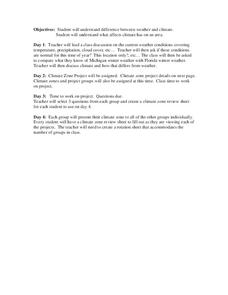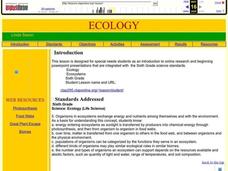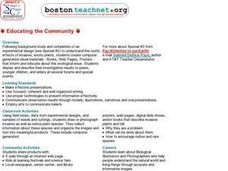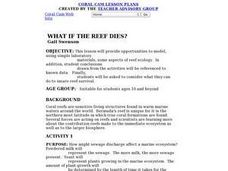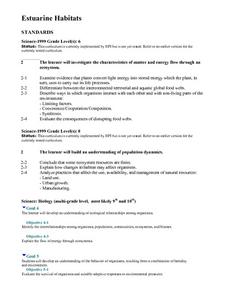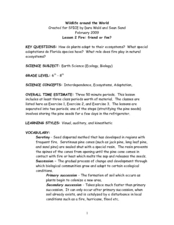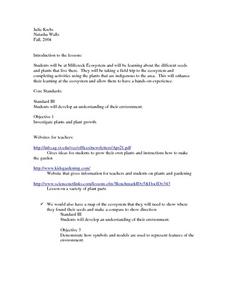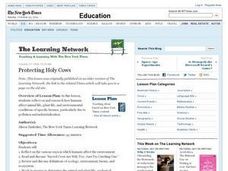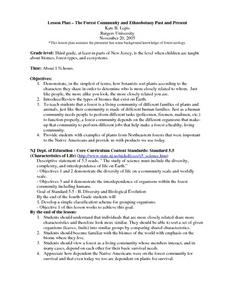Curated OER
Food Webs
Students recognize interdependence in a food web by using yarn and notecards to create a food web and discussing what would happen if one of the organisms from a certain trophic level is removed.
Curated OER
Biotechnology
Students explore biotechnology through various activities. In this biology lesson, students analyze its pros and cons. They study and read informative articles about biotechnology.
Curated OER
Aquatic Habitat Water Quality Experiment
Fifth graders discuss the importance of water quality for humans and fish and make predictions about what happens to water that is polluted. In small groups, they conduct experiments to compare and contrast water that is unpolluted and...
Curated OER
Weather Versus Climate
Students differentiate weather and climate. In this earth science lesson, students investigate the climate of a zone they chose. They create a presentation and share their findings with the class.
Curated OER
Ecology
Sixth graders are introduced to online research and beginning PowerPoint presentations that are integrated. They pass a plant and photosynthesis. Students locate information on a self selected animal online. They give a PowerPoint...
Curated OER
Plant and Animal Cells - Are they Different?
Students observe the similarities and differences between plant and animal cells. In this cell activity, students use microscopes to observe self prepared slides of animal and plant cells.
Curated OER
Mangrove Ecology and Adaptations
Students create a plant or animal that would be well adapted to a habitat they selected. They first learn about Mangroves and their specific adaptations that help them survive in their habitat.
Curated OER
Mangrove Ecology & Adaptations
Pupils creat a plant, animal, or other living organism that would be well adapted to a habitat that they previously selected. First they learn about adaptations of Mangroves.
Global Oneness Project
The Consciousness of Nature
Scholars voice their opinions about animal consciousness with an article that challenges common ideas about nature. After reading the article, learners engage in a thoughtful discussion before writing out their arguments...
National Park Service
Living & Non-Living Interactions
What better way to learn about ecosystems than by getting outside and observing them first hand? Accompanying a field trip to a local park or outdoor space, this series of collaborative activities engages children in...
Poetry Class
Tackling Climate Change
Get your kids thinking about climate change with a series of activities that include creating a ditty box poem for the planet, a poem that identifies concepts or objects they would want to preserve.
Virginia Department of Education
Succession
The final lesson in a two-part series prompts scholars to create newspaper articles and succession events. Applying their knowledge of the ecosystem and the past examples of succession, they predict what will happen in the future...
Curated OER
Prairie Conservation
Fourth graders conduct online research related to prairie conservation, prairie plants and animals, and the ecological system of the prairie.
Curated OER
Salinity Of Soil
Fourth graders investigate the contents of various types of soil to determine the differences in salinity levels. They conduct an experiment of observing the plants in the different soils. Students then determine survival rates by...
Curated OER
Educating the Community
Students research the effects of invasive and exotic plants. They create posters, webpages and books to educate the community. They present their material in different forums.
Curated OER
Cleansing, Sparkling Koos
Students explore the importance of water conservation and investigate how plants clean water.
Curated OER
What If the Reef Dies?
Students complete four activities to investigate how reef ecology can change. They perform experiments to show how sewage discharge can affect a marine ecosystem, look at substances that don't dissolve in water, examine wave action...
Curated OER
Estuarine Habitats
Sixth graders study the important habitats, flora, fauna, and physical factors of coastal habitats. They compare the aquatic habitats to terrestrial habitats by researching and completing tables with the information.
Curated OER
Wildlife Around the World
Middle schoolers examine how plants are able to adapt to their ecosystem and the role that fire plays in changes through the years. In this ecosystem lesson students complete several exercises focussing on plants and their...
Curated OER
Ecosystem Field Trip
Students investigate the different seeds and plants that are part of the Millcreek ecosystem. They take a field trip to the ecosystem and complete activities using the plants that are indigenous to the area.
Curated OER
Rainforest Food Chain
Students investigate a rainforest food chain. In this ecology lesson, students are shown pictures of plants and list what animals might eat the plants. Students continue to think of what other animals might eat those animals. Students...
Curated OER
Colors of our Earth
Students are introduces to soil profile classification. They remember that classification of soils is an important aspect of studying soils as it aids in predicting how soils react to weathering, transport nutrients or pollution. ...
Curated OER
Protecting Holy Cows
Students study the interrelationships of organisms and their environments. They study ecological communities and determine what is necessary for survival. Students discuss and answer questions concerning a group's biome, habitat, food...
Curated OER
The Forest Community And Ethnobotany Past And Present
Students describe a forest as a living community. They determine members interact, and in many cases, depend on each other for their basic survival needs. They investigate how dependent the Native Americans were on the forest...



